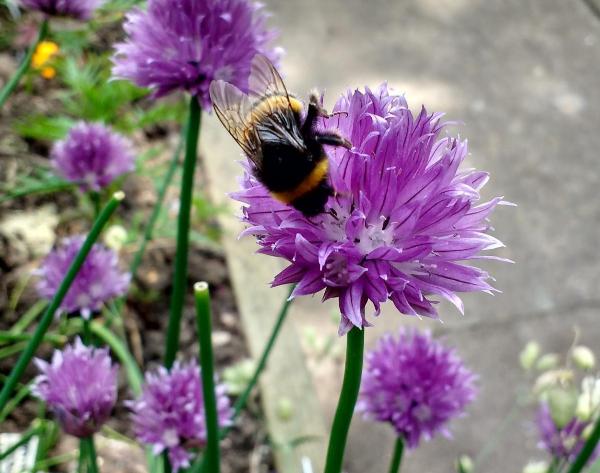News • Good Food Trade Campaign
Sustain Brexit Forum news roundup: Environment policy
A new Environment Act, green watchdog and institutions to regulate chemicals are all needed - and must be robust enough to defend our health and the natural environment. Just some of the issues being addressed in UK environment policy. This is an extract from Sustain's Brexit Forum newsletter, June/July 2018. Sign up to receive news updates monthly or bi-monthly at: www.sustainweb.org/brexit

Follow the Greener UK alliance on Twitter: https://twitter.com/GreenerUK_
Environment policy developments came during a global heatwave and amidst stories of calamitous loss of biodiversity, including significant declines in butterflies in the UK and the need to regulate pesticides to protect pollinators. Whilst the Brexit manoeuvres rumble on, the Climate Change Committee has patiently kept up its important work, reminding us that: “While other sectors of the economy, such as power, waste and construction, have been steadily reducing their greenhouse gas (GHG) emissions over the past decade, agriculture has failed to keep pace,” underlining the need for robust policy and enforcement.
Time for a robust UK Environment Act
PM Theresa May has announced the long-awaited Environment Bill (to become the new UK Environment Act). Amy Mount of Greener UK said, “The Bill will need to put new duties on the secretary of state to deliver on environmental objectives like clean air, recycling and species loss.” Greener UK, ClientEarth and Wildlife and Countryside Link have also been working up detailed proposals for how good environmental governance should be implemented and enforced.
Environmental organisations are coming together under the alliance banner of Greener UK in the call for the new UK Environment Act to deliver “a strong independent watchdog,” in a way that “codifies the environmental principles in UK law, and ambitious measurable targets for nature’s recovery and a healthy environment”. The aim is to achieve:
- An Environment Act, passed by summer 2020 with cross-party support.
- Minimum environmental standards and shared ambition across the four governments of the UK, and cross-border co-operation.
- Ambitious goals set out in the Environment Act (accompanied by a possible UK environment statement and/or legislation by devolved governments), and accompanying narrative from the UK government, providing a strong foundation for UK international environmental leadership.
- The new ‘green watchdog’ and national policy statement on principles in place before post-transition exit day (December 2020) – robust and independent, with the necessary resources and expertise to do the job well.
The UK Agriculture and Fisheries Bills are recognised as important opportunities to press for statutory underpinning for environmental objectives – either by amending these bills, or by securing government promises to include such objectives in the Environment Bill.
“We face an increasingly urgent need to step up collective efforts to address environmental challenges, and meet shared international commitments, in relation to issues such as biodiversity loss, climate change and air quality,” says Greener UK in a new environment policy briefing for parliamentarians and policy makers. “These issues do not respect national borders and will continue to be affected by the policies adopted across the UK and the EU-27 following Brexit.”
The UK’s green watchdog must have teeth
Twenty-five members of Wildlife & Countryside Link have stressed the need for a new UK environmental watchdog to have the capacity and powers to enforce environmental law. Link has called for the watchdog to have sufficient funding, be fully independent from Government and be able to take the Government to court. To be effective, the new watchdog must also have power over both central government and other public bodies, and a comprehensive set of environmental principles must be enshrined in law.
Such concerns were echoed in the parliamentary Environmental Audit Committee report, insisting that the green watchdog must have teeth. The EAC called for the Government to establish a new independent oversight body—the Environmental Enforcement and Audit Office (EEAO) — modelled on the National Audit Office (NAO), to ensure that the governance, enforcement, oversight and policy functions currently carried out by the European Commission and European Court of Justice are not lost after leaving the EU. The EAC also called for targets on air, water, soil, biodiversity and other issues to be legally binding and subject to five-yearly reports, in a similar way to carbon budgets produced by the Committee on Climate Change under the 2008 Climate Change Act.
The Chair of the UK’s Committee on Climate Change Lord Deben, and the Chair of the Adaptation Sub-Committee Baroness Brown of Cambridge, have written to Defra Secretary Michael Gove urging him to ensure that the new green watchdog has climate change in its remit. They also echo calls from many other organisations to ensure that the new body has sufficient powers and rigour to hold the UK government to account; and that relevant environmental principles be explicitly included in the Act of Parliament that will establish the body.
Regulation of chemicals, disease control and more
The EU has a regulatory structure with over 40 agencies in addition to the core institutions like the European Commission and the European Parliament. The UK is interested in remaining part of some EU agencies after Brexit, but as the Institute for Government explains, there aren't many precedents.
Environmental NGOs and the chemical industry are in agreement that post-Brexit Britain should remain part of the chemicals regulatory system REACH and the EU Chemicals Agency ECHA, whatever the final outcome of Brexit. As CHEM Trust explains, this would demonstrate “the numerous benefits of the EU’s world-leading chemical safety laws” and preventing the UK having to set up a complex and costly chemicals regulation system of its own.
The Faculty of Public Health has launched a blueprint to recommend how the UK could continue a post-Brexit relationship with the European Centre for Disease Prevention and Control (ECDC). The hope of the FPH is that this will support the government in delivering their commitments to improve health security and continue collaborating with Europe on health issues after Brexit.
Published Tuesday 31 July 2018
Good Food Trade Campaign: Campaigning for good trade that benefits people and the planet at home and overseas.





